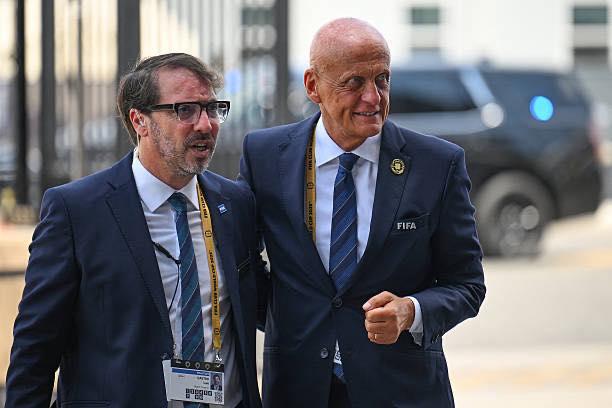Pierluigi Collina, Chairman of the FIFA Referees Committee, has hailed the success of several refereeing innovations debuted at the FIFA Club World Cup 2025™, highlighting the positive impact of referee body cameras, advanced semi-automated offside technology, and a new eight-second rule for goalkeepers.**
The 2025 tournament marked the first time FIFA deployed body cams on referees at a major competition. Collina described the response as overwhelmingly positive, noting that the new technology exceeded expectations. The body cams offered fans and officials a unique view of the action, directly from the referee’s perspective.
“The outcome of using the ref cam here at the FIFA Club World Cup 2025 went beyond our expectations. We thought it would have been an interesting experience for TV viewers and we’ve received great comments,” Collina said. “We were asked: ‘Why not in all the matches?’ and even more: ‘Why not in all sports?’”
Beyond enhancing the viewing experience, Collina emphasized the value of body cams for referee training and analysis. He cited a group stage match between Atlético de Madrid and Paris Saint-Germain, where the technology clarified why a handball incident went unseen by the referee due to an obstructed view. The video assistant referee (VAR) intervened, leading to a correct penalty decision.
A significant rule change was also introduced: goalkeepers now face a corner kick against their team if they hold the ball for more than eight seconds, replacing the previous six-second indirect free kick rule. This amendment, passed by the International Football Association Board (IFAB) in March 2025, aimed to reduce time-wasting.
Collina reported that the new rule was highly effective:
* Tempo improved: Matches saw less time lost to goalkeepers holding the ball.
* High compliance: Only two goalkeepers were penalized, demonstrating widespread respect for the rule.
* Objective achieved: The focus was on prevention, not punishment, and teams adapted quickly.
The tournament also featured an advanced version of semi-automated offside technology. According to Collina, this system sped up offside calls and reduced unnecessary play stoppages, ensuring that decisions were both timely and correct.
“The alert went to the assistant referees well before, when there was a clear offside position. So, it worked very well, we have the goals disallowed, correctly disallowed; we also had correct decisions supported by the semi-automatic offside technology – [we are] very happy, very pleased,” he said.
A total of 117 match officials from 41 member associations oversaw the 63 matches of the expanded 32-team tournament. Collina concluded by praising the overall quality of officiating and the pride felt by those involved:
“It was a great competition. The people attending the matches confirm this, it was well played by players and well refereed by match officials. And all the referees who are here are 100% proud of being part, of having been part of this first time ever.”
Source: FIFA.com




















